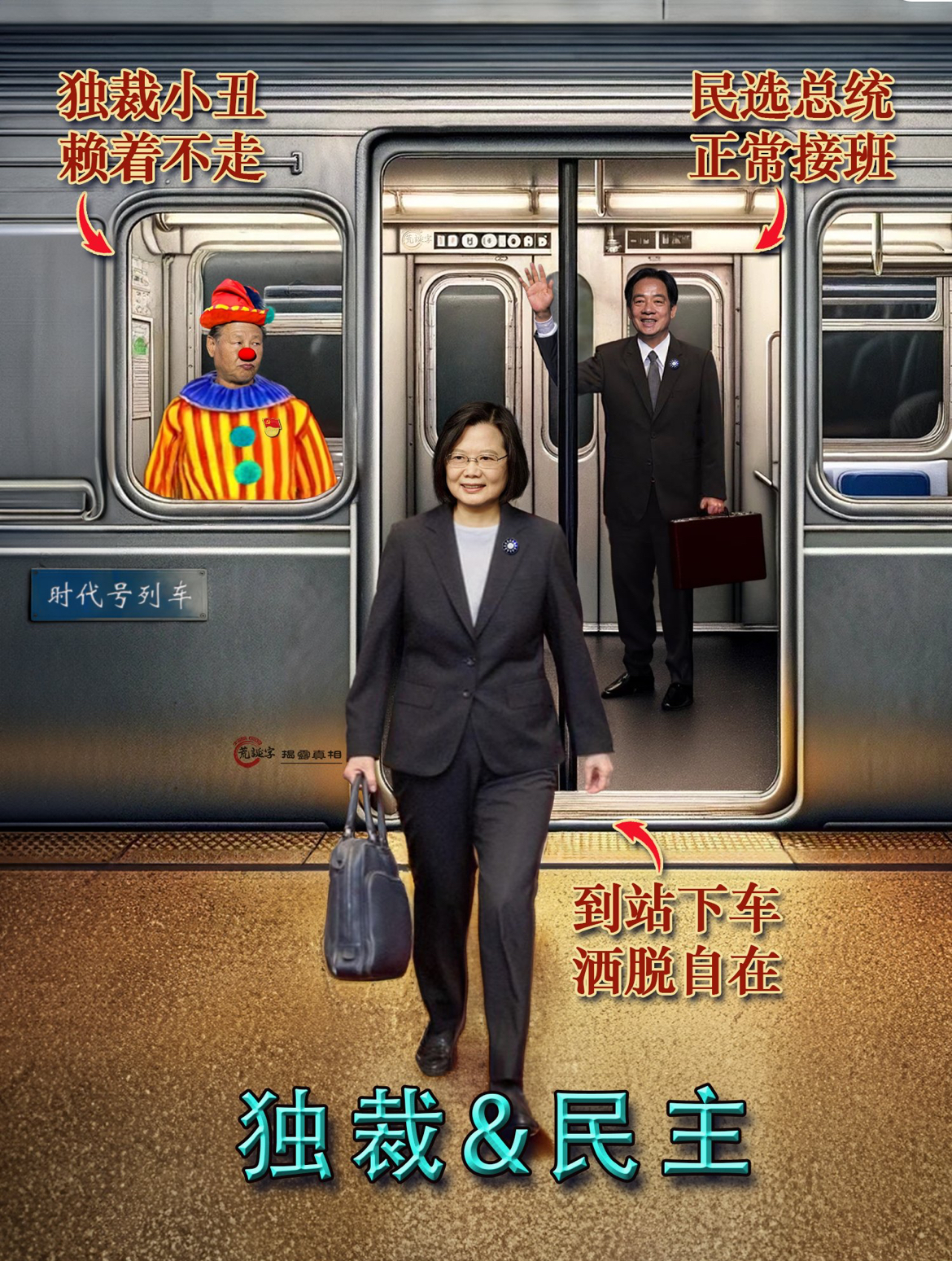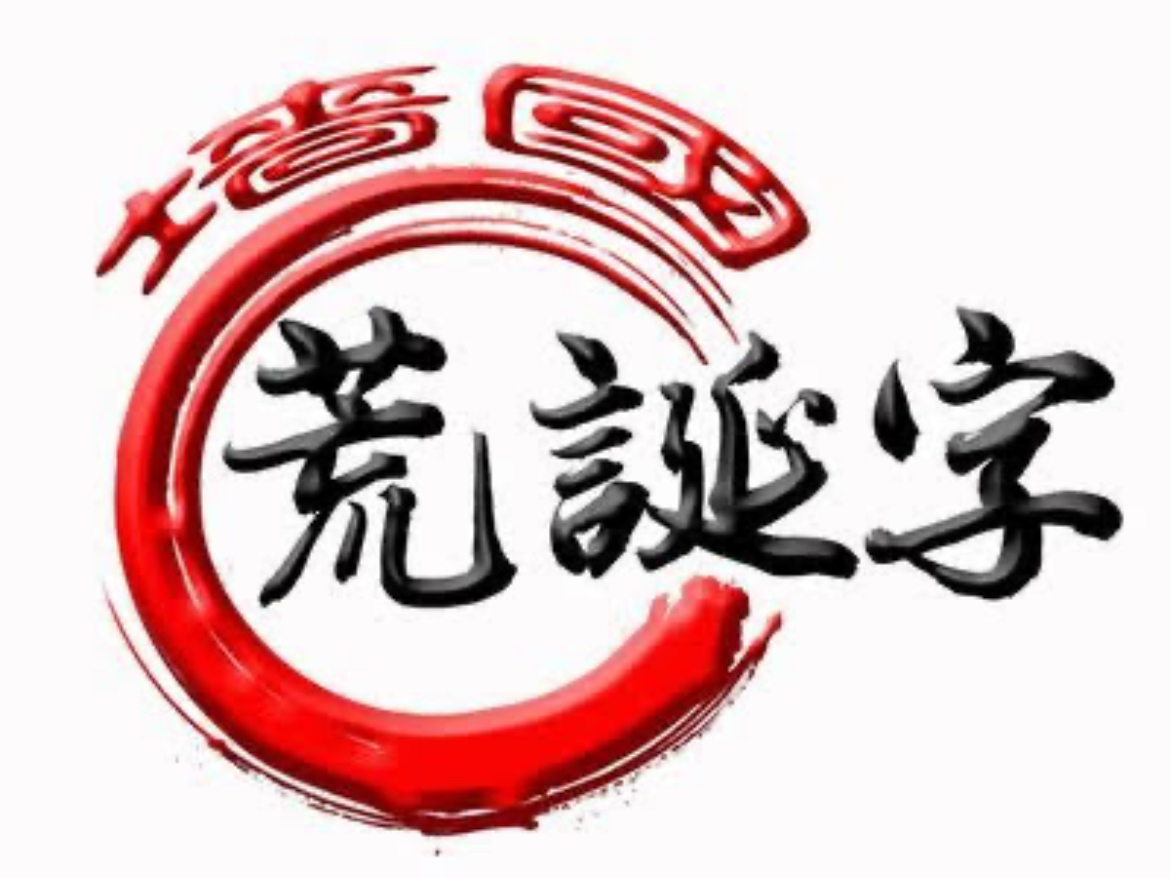Xi Jinping’s Empire of Tedium
Chapter XI
牆國荒誕字
一把辛酸淚
In the Xi Jinping era, the term Great Power 強國 qiáng guó, literally ‘powerful nation’, is a commonplace term for China itself. It encapsulates the quest of the People’s Republic of China in the twenty-first century to be a superpower. Those who note the yawning chasm between such hubris and the realities of a fearful, censorious and paranoid party-state prefer to use the homonym 牆國 qiáng guó. It means ‘the walled-in nation’, a reference to the ‘locked-in syndrome’, or pseudo-comatose state of the country resulting from the ruling Communist Party’s tireless regime of censorship and the policing of what, in 1997, we dubbed The Great Firewall of China.
[Note: For more on the term Great Power 強國 and China’s Third Age, see Homo Xinensis Ascendant, China Heritage, 16 September 2018.]
Since 2021, an online collective cultural activist going by the name ‘Recording the Absurdities of the Locked-in Nation’ 牆國荒誕字 has posted political satires — songs, images, comments and short essays — on X/Twitter and YouTube.
‘Recording the Absurdities of the Locked-in Nation’ says that his efforts are
focussed on presenting original (or occasionally re-cycled) comic videos and spoof songs. The aim of our comedy, satire and commentary is to highlight the absurdities, evils, stupidity, arrogance, obduracy, shamelessness and more of China’s totalitarian ruling class and its dictator. 本頻道以搞笑視頻、諷刺搞笑歌曲為主,皆為原創(部分二創);以搞笑、戲說、諷刺、批判的形式,揭露極權統治階級及獨裁者的荒唐、邪惡、愚蠢、狂妄、蠻橫、無恥……
‘I write about the absurdities of the Locked-in Nation’, the author declares, ‘in language that is accessible to everyday people.’
寫百姓看得懂的漢字,書寫牆國荒誕之事。
For details, see:
- YouTube: https://youtube.com/@qghdz; and,
- Twitter: x.com/xingzhe2021
***
Humour, social commentary and mockery have long been a feature of modern Chinese culture (see 幽默: You Having a Laugh? The Birth of Humour in Modern China) and I have followed and recorded aspects of Chinese political humour, artistic satire and comedy since the late 1970s (see, for example, Evening Talks at Yanshan; Peking Duck Soup; Beijing teahouse raconteurs; Yau Ma Tei’s Playhouse; and, The Master of Mirth’s satirical essays). The ways in which people from all walks of life lampoon Chinese politics has also been a feature of the work of China Heritage (for details, see the reading list below).
Between Beijing’s Olympic Year, 2008, and the rise of Xi Jinping in late 2012, a culture of spoofs, social and political, flourished. The mockery took many forms and soon something of a satirical bestiary was flourishing. It began with the advent of the Grass-mud horse 草泥馬 cǎonímǎ and deified the authorities in the form of the Little White Rabbit Kuangkuang, featured in a video released in January 2011 to mark the start of the Lunar Year of the Rabbit:
***
Despite the best efforts of the authorities, political humour flourishes behind China’s Great Fire Wall. International Chinese culture, a veritable multiverse, is immeasurably enriched by the ‘push factors’ of the Xi Jinping era, and it has also witnessed the advent of rogue political celebrities, from standup comics and musicians like Namewee to Teacher Li. Absurdities of the Locked-in Nation 牆國荒誕字 has become another thorny presence in what is known as the 簡中圈 — the global realm of Simplified Chinese (or ‘the Simplified Sinosphere’) — and in Xi Jinping’s Empire of Tedium.
This compilation of humorous songs is dedicated to the memory of Simon Leys, who came to fame in 1971 with The Chairman’s New Clothes: Mao and the Cultural Revolution. It was, to quote his biographer, ‘a red-hot rant of a book’; it was also very funny.
Readers in China and around the world interested in Chinese history and culture, the spirit of humanism, literature, and the life of the mind will continue to discover and rediscover the work of Simon Leys. ‘Let’s keep reading these works’, the philosopher Jean-François Revel wrote forty years ago in his preface to Leys’s Chinese Shadows, ‘so that we may see that in the age of the lie, the truth sometimes throws its head back and bursts out laughing.’
***
The Chinese rubric of this compilation — 牆國荒誕字/ 一把辛酸淚 — is a reference to a famous line in the first chapter of Cao Xueqin’s Dream of the Red Chamber 曹雪芹著《紅樓夢》:
滿紙荒唐言,一把辛酸淚,都云作者痴,誰解其中味。
Pages full of idle words
Penned with hot and bitter tears:
All men call the author fool;
None his secret message hears.
— Geremie R. Barmé
Editor, China Heritage
22 September 2024
***
Lampooning Chinese Politics in China Heritage
- The Right to Know & the Need to Lampoon, 18 October 2021
- The Fog of Words: Kabul 2021, Beijing 1949, SupChina, 24 August 2021
- October 1 & October 10 — Two Chinas, Whose Fatherland?, 1 October 2022
- Tired of Winning Yet, China? — The Band Slap Has Some News for You, 14 June 2023
- The Topsy-turvy Country — China’s Summer Hit, 28 July 2023
- Voices from The Other China — Ten Podcasts & Twenty YouTube Channels, 10 August 2023
Liu Chan’s Social and Calligraphic Commentary in China Heritage:
- On Rumours & Lies — Dasheng’s Little Lectures, 16 January 2023
- Brainwashing vs. Educating — Dasheng’s Little Lectures, 17 January 2023
- Resisting Cultural Capture — Dasheng’s Little Lectures, 18 January 2023
- In the Eyes of the Beholder — Dasheng’s Little Lectures, 19 January 2023
- Liu Chan’s Calligraphic Comment on 7 October 2023, 8 October 2023

***
翻牆
Climbing Over The Wall
有一個邪惡的政權
把中國的互聯網建了一堵嬙
這阻斷了十四億
中國人民
與整個世界的交流 ⋯
In Washington, on 23 July 2024, the House Select Committee on the Chinese Communist Party held a hearing titled ‘The Great Firewall and the CCP’s Export of its Techno-Authoritarian Surveillance State.’ All of the witnesses who testified in front of the committee spoke with one voice, and called for the Great Firewall of the Chinese Communist Party to be torn down!
John Moolenaar, Chair of the Select Committee, said that ‘With an army of censors boosted by artificial intelligence and other cutting-edge technology, [the Great Firewall] monitors all information and expression within China, rapidly stamping out anything that diverges from the party line. … What Reagan observed in Berlin, is still true today “This wall will fall. For it cannot withstand faith; it cannot withstand truth. The wall cannot withstand freedom.” ’
This news inspired me to write ‘Climbing Over the Wall’.
美東時間7月23日,美國眾院中共問題特設委員會舉行公開聽證會,聚焦討論中共防火牆和監視技術輸出。會議上發言的中國人和美國人發出同一個聲音:推倒中共防火牆!美眾院中共問題特設委員會主席約翰•穆勒納爾:中共把互聯網從自由工具變成了終極控制工具!中共的防火牆終將倒塌!看到以上消息,我製作了這首歌曲《翻牆》。
See also:
***
大海航行靠舵手
Sailing the Seas Depends on the Helmsman
Sailing the Seas Depends on the Helmsman, written by Yu Wen to a score by Wang Shuangyin, was the unofficial anthem of the Cultural Revolution. For the official version of this song, see:
www.morning-sun.org/multimedia/music.html
Xi Jinping is hailed by China’s state media as ‘the helmsman of the great revival of the Chinese nation’ 中華民族偉大復興的領航人。
***
中南海
Zhongnanhai, Heart of the Party-State
菜籃的韭菜香
聽我來唱一唱,唱一呀唱
來到了中南海
中南海好地方,好地方
好地方來好風光
到處是太監,遍地是奴才 ⋯
This is a parody of Nanniwan 南泥灣, a song written in 1943 to promote the Big Production Campaign in the wartime Communist guerrilla base at Yan’an in Shaanxi.
***
我一無所有
Nothing to My Name
The title of this satirical work recalls Cui Jian’s famous 1986 song. See the reference to Cui in 職責— It’s My Duty, Appendix XXIV of Xi Jinping’s Empire of Tedium.
***
籠的傳人
Descendants in a Cage
古老的東方有一個籠它的名字叫中國
克老的東方有一群人。
他們全都是籠的傳人 ⋯
This is a reworking of Descendants of the Dragon 龍的傳人, a famous ballad by Hou Te-chien/ Hou Dejian. See:
- An Ambitious Dragon’s Nightmare, The Other China, 26 January 2024
***
牆國台灣對比
Locked-in China vs. Taiwan

台灣民主選舉,世界矚目。
蔡英文總統八年執政,政績斐然,世人有目共睹!任期屆滿,到站下車,拎包走人,灑脫自在!新總統賴清德接任,繼續為台灣人民服務!民選政權,才能真正的為人民服務!對岸那個獨裁者習近平(盡貧),嘴裡天天喊著為人民服務,其實是個禍國殃民的竊國賊、賣國賊!光屁股小丑,為了連任,篡改憲法,到站不下車,賴著不走,繼續禍害百姓,甚至危害整個世界!
See also:
- On the Road — Taipei vs. Beijing, 12 January 2024
***
改革家
The Self-styled Reformer
2012年那是一個冬天
有一位紅二代
靠著父輩的資源靠著裝孫子
靠著扮豬吃老虎
僥倖登上了大位權力大的上了 ⋯
This song was a response to what one analyst calls the ‘revolt against reformer Xi Jinping’ in the northern summer of 2024, when it was rumoured that Xi’s credentials as a serious economic reformer were challenged by Communist Party insiders. See:
- Katsuji Nakazawa, Elders stay faithful to Deng over ‘reformer Xi Jinping’, Nikkei, 29 August 2024
***
我是一棵小韭菜
I’m just a bunch of Garlic Chives
See also:
- Xi Jinping’s Harvest — from reaping Garlic Chives to exploiting Huminerals, 6 January 2023
- Xi Jinping’s Harvest — an anthem for China’s disaffected Huminerals, 7 January 2023
- ‘You are garlic chives!’ — Trisolarans, Burn Book and China’s Men in Black, 20 April 2024
***
指明方向
Pointing the Way
See also:
- Emperor One Direction — Xi Jinping, 1 June 2024
***
大撒幣
Chairman Cash-splash
Over-investment in international aid may well result in deprivations at home. It is said that China is now the world’s largest source of international aid; its cash-splashes are counted in the billions or tens of billions of dollars. For a developing country with a large population many of whom still live in a pre-modern economy, such behaviour is outrageously disproportionate. These are policies born of ‘Vanity Politics’; they reflect the flashy showmanship of the boastful and they are odious.
— Xu Zhangrun, Fear Five: Excessive International Aid
***
回來啦
Is this a comeback?
***
井底之蛙
A Frog’s-eye View
See also:
- 瞽 — You Should Look Back, 1 February 2022, the introduction to Xi Jinping’s Empire of Tedium
***
肇事伺機
A Dangerous Driver
As we noted in You Should Look Back, independent Chinese commentators were increasingly alarmed that the country was speeding forward, but in the wrong direction 加速開倒車. Substantive issues presumably resolved from the 1980s — the dangers of one-man rule and personality cults; strict term limits for political leaders; the succession crises that had bedeviled the Communists for decades; the separation of Party and State; the evolution of the rule of law and lawyers; the growth of a semi-independent media and publishing industry; academic freedom; a corralled civil society and a popular awareness of personal rights; the de-politicisation of the everyday; the reining in of militancy and extremist rhetoric; the demonisation of ethnic minorities and vulnerable groups; the gradual embrace of basic values and rights, along with many other things — were not, in fact, resolved. Rather, they unravelled, and the data pointed in an accrescent portfolio of backsliding. …
In his day, Deng Xiaoping was hailed as the Grand Engineer of Reform 改革開放和現代化建設總設計師, Xi Jinping, however, was China’s Architect of Acceleration 總加速師, the man whose policies had dramatically reversed the trajectory of the nation and a leader whose ambitions could well precipitate systemic failure, if not collapse.
— from The Threnody of Tedium
***
中共口炮部
The Ministry of Loudmouthed Commies
I had questions about law, legal trials, people’s courts and ‘mass’ judgments with the attendant risk of prejudice and passion; a question on the writer Hu Feng and the demarcation between expression of personal opinion and counter-revolutionary thought or behaviour; the ineptness of Chinese propaganda abroad, with its bombast and smugness; the low political level of criticism of individuals in the mass political campaigns (in so far as I had been able to find out). There were questions about the plethora of bureaucrats, all non-productive, and the rising élitism among the bureaucracy, as exemplified by priorities, perks, such as travel on trains.
— from Han Suyin’s account of her first meeting with Chinese Premier Zhou Enlai, June 1956
***
小粉紅
Little Pinks
See Namewee’s song Hearts of Glass 玻璃心:
So sorry to cause offense
Hurt your feelings, your self-esteem
Is that sound your hearts of glass
Breaking into little bitty pieces?
對不起傷害了你
傷了你的感情
我聽見有個聲音
是玻璃心碎一地
***
新東方紅
The East is Red Again
See www.morning-sun.org/multimedia/music.html and, for a dramatic depiction of the relationship between the solar Mao and the sunflowers of China, see ‘Dawn in the East’, the opening scene of the song-and-dance extravaganza ‘The East is Red’ at:
www.morningsun.org/east/index.html
***
習主席,你還好嗎?
You sure you’re okay, Chairman Xi?
***
勿忘六四
June Fourth
***
《中國人的國歌》
A People’s Anthem
This is a reworking of March of the Volunteers 義勇軍進行曲, originally titled March of the Anti-Manchukuo Counter-Japan Volunteers 反滿抗日義勇軍進行曲, the lyrics of which were written by Tian Han in 1934 and the music composed by Nie Er in 1935. March of the Volunteers has been the official national anthem of the People’s Republic of China since 1978.
***


